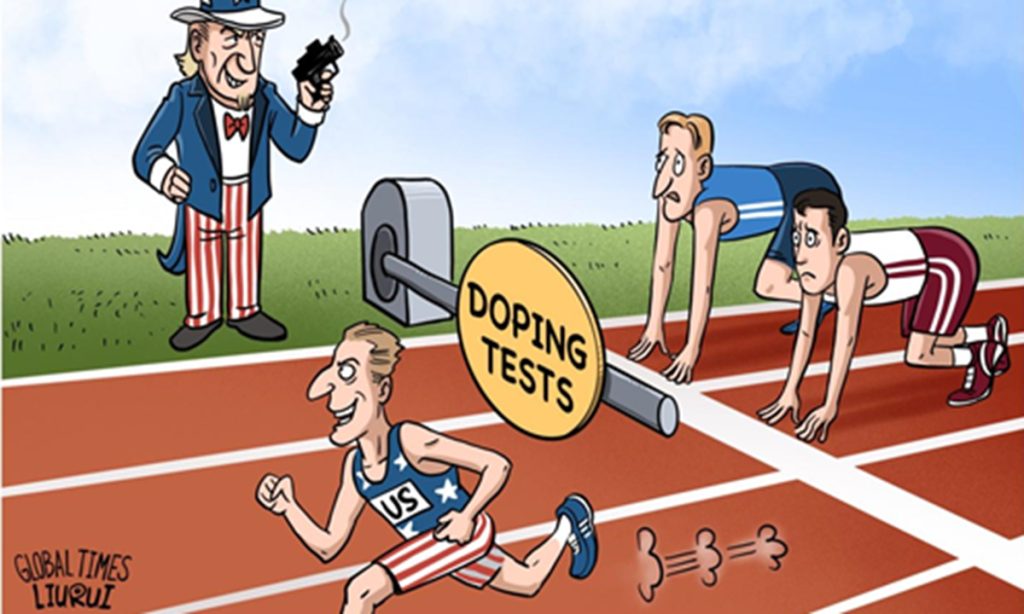CHINADA calls for independent probe on misconduct

The China Anti-Doping Agency (CHINADA) on Thursday called for an independent investigation into the actions of the US Anti-Doping Agency (USADA), following latest revelations about the USADA's misconduct.
According to a Reuters report published on Wednesday, USADA has been implicated in serious violations of anti-doping regulations, allowing athletes who had doped to compete for years, without ever publishing or sanctioning their rule violations.
The Chinese anti-doping body emphasizes that USADA's actions severely compromised the integrity of sports, as it lacks transparency and operates with double standards.
"USADA has long ignored its own anti-doping shortcomings while attempting to impose double standards on other countries, exposing its hypocritical and inconsistent approach to anti-doping enforcement," CHINADA said in a statement sent to the Global Times.
This is the fifth statement that CHINADA has released since July to demand transparency and justice from the USADA for athletes.
The US hype since April 2024 on a 2021 food contamination case of Chinese swimmers had led to an excessive anti-doping testing scheme against Chinese athletes ahead of and during the Paris 2024 Olympics to prove their cleanness.
"The US' ultimate goal is to prevent China from advancing," Shen Yi, director of the International Research Institute of Global Cyberspace Governance at Fudan University, told the Global Times on Thursday.
"Before the Paris Olympics, the hype on Chinese swimmers has been used to weaponize the anti-doping system. The aim is no longer to detect doping but to disrupt Chinese athletes' training and competition schedules under the guise of proving China's integrity," Shen said.
The World Anti-Doping Agency (WADA) said Wednesday that USADA's actions are "in direct contravention of the World Anti-Doping Code and USADA's own rules."
These athletes were allowed to act as "undercover informants" for USADA, which is a practice that WADA instructed USADA to desist in 2021.
"This USADA scheme threatened the integrity of sporting competition, which the Code seeks to protect," WADA said in the statement. "By operating it, USADA was in clear breach of the rules."
International Olympic Committee (IOC) spokesperson Mark Adams expressed support for WADA on Thursday, saying the IOC will continue to work with its stakeholders to make sure there are "good and robust" anti-doping systems.
WADA highlighted that since 2011 USADA permitted at least three athletes who tested positive for steroids and erythropoietin (EPO) to continue competing until their retirement.
CHINADA's latest statement also suspects whether USADA's board and the US Congress were aware of these breaches and the associated security risks. It calls for USADA to publicly disclose the details of the implicated cases and respond to public concerns. "We strongly call on the US Congress and the USADA Board of Directors to face up to the grave problem of doping in the US itself and the serious governance flaw in USADA," CHINADA said in the statement. "The US should enhance oversight and regulation of USADA, strengthen domestic anti-doping efforts, and immediately cease the overreach and interference in other countries' anti-doping efforts," CHINADA said.
Earlier on the same day, CHINADA, in a separate statement, called for intensified testing on US athletes to rebuild global trust in fair play, as US Olympic sprinting star Erriyon Knighton tested positive for banned steroid trenbolone during an out-of-competition test in March 2024 but was still allowed to compete in Paris.
Shang Ximeng, a research fellow at the Center for International Sport Communication and Diplomacy Studies at the Beijing Foreign Studies University, said the US has always been an exception in anti-doping efforts. "Despite that Chinese sports authorities did not target American athletes in a similar manner like the US hype did on Chinese athletes, the Chinese delegation still faces a lot of criticism in Paris," Shang told the Global Times. "China has demonstrated its integrity through more frequent testing, but this approach may not be the best way to protect the Chinese athletes' rights."
The doping disputes between China and the US are a microcosm of the broader strategic rivalry between the two countries, Shen Yi said.
CHINADA strongly called on the International Testing Agency (ITA) to intensify testing on the US track and field athletes, and recommended that the Athletics Integrity Unit (AIU) strengthen anti-doping supervision of the US Track and Field, prevent the doping risks and strictly investigate relevant cases in an endeavor to truly protect the legitimate rights and interests of the clean athletes around the world and to rebuild the trust of global athletes in fair play.
Chinese athletes should be subject to the same doping standards and procedures as their US counterparts, without any double standards, Shen noted.
"The US has turned anti-doping measures into a tool to suppress countries outside the Western sphere, creating an unfair competitive environment for athletes from other nations," Shen told the Global Times. "If the US finds this unacceptable, then the US must adhere to China's standards and practices."